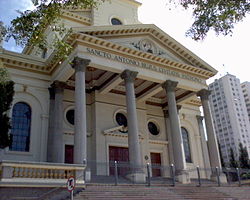Americana, São Paulo
| Americana | |||
|---|---|---|---|
 |
|||
|
|||
 Location in the São Paulo state. |
|||
| Location in the São Paulo state. | |||
| Coordinates: 22°44′19″S 47°19′52″W / 22.73861°S 47.33111°WCoordinates: 22°44′19″S 47°19′52″W / 22.73861°S 47.33111°W | |||
| Country |
|
||
| Region | Southeast | ||
| State | São Paulo | ||
| Metropolitan Region | Campinas | ||
| Founded | 1875 | ||
| Government | |||
| • Mayor | Omar Najar (PMDB) | ||
| Area | |||
| • Total | 133.91 km2 (51.70 sq mi) | ||
| Elevation | 569 m (1,867 ft) | ||
| Population (2015) | |||
| • Total | 229,322 | ||
| • Density | 1,700/km2 (4,400/sq mi) | ||
| Demonym(s) | Americanese | ||
| Time zone | BRT (UTC-3) | ||
| • Summer (DST) | BRST (UTC-2) | ||
| Postal code | 13465-000 | ||
| Area code(s) | (+55) 19 | ||
| HDI (2000) | 0.840 – high | ||
| Website | Americana website | ||
Americana (Portuguese pronunciation: [ameɾiˈkɐnɐ]) is a municipality (município) located in the Brazilian state of São Paulo. It is part of the Metropolitan Region of Campinas. The population is 229,322 (2015 est.) in an area of 133.91 km². The original settlement developed around the local railway station, founded in 1875, and the development of a cotton weaving factory in a nearby farm.
After 1866, several former Confederate citizens from the American Civil War settled in the region. Following the Civil War, slavery was abolished in the United States. In Brazil, however, slavery was still legal, making it a particularly attractive location to former Confederates, among whom was a former member of the state Alabama Senate, William Hutchinson Norris.
Around three hundred of the Confederados are members of the Fraternidade Descendência Americana (Fraternity of American Descendants). They meet quarterly at the Campo Cemetery.
The city was known as Vila dos Americanos ("Village of the Americans") until 1904, when it belonged to the city of Santa Bárbara d'Oeste. It became a district in 1924 and a municipality in 1953.
Americana has several museums and tourist attractions, including the Pedagogic Historical Museum and the Contemporary Art Museum.
Rio Branco Esporte Clube, founded in 1913, is the football (soccer) club of the city. The team plays their home matches at Estádio Décio Vitta, which has a maximum capacity of 15,000 people.
The first records on the occupation of the lands where Americana now stands date from the late 18th century, when Domingos da Costa Machado I acquired a crown property between the municipalities of Vila Nova da Constituição (now Piracicaba) and Vila de São Carlos (now Campinas). In that area several estates were created, including Salto Grande, Machadinho, and Palmeiras.
...
Wikipedia



